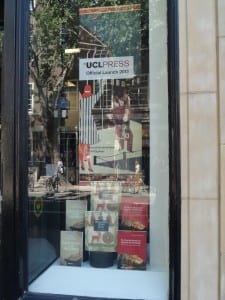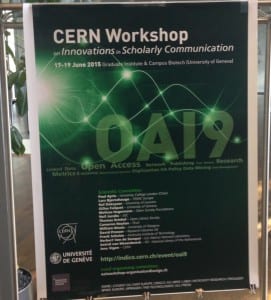24-26 June 2015 saw the 44th LIBER Annual Conference take place in London, organised by Imperial College London, the University of London, UCL and the LSE. 
480+ attenders from all over Europe were present at the event, with visitors also from Canada, the USA and elsewhere. LIBER 2015 is the largest Conference in LIBER’s history. The theme of the Conference was Towards Open Science – a global movement which sees openness and sharing as crucial themes in the processes involved in research and education.
The two keynote speakers on Day 1 set the tone for the whole Conference. Sir Mark Walport, Chief Scientific Adviser to HM Government and Head of the Government Office for Science UK, gave the opening keynote to a packed audience in Beveridge Hall, Senate House. What is a library in the 21st century? The role of a library is to communicate knowledge, and knowledge is power. New models of doing and publishing science will inevitably alter how results and supporting data are stored and disseminated. Sir Mark Walport discussed how libraries can work to maximise the distribution of knowledge, while protecting the intellectual property of its authors. For Sir Mark, electronic publication is a second Gutenberg moment. Science is not finished until communicated. For Sir Mark, librarians are visionaries who will help deliver the revolution which comes in the wake of the Open agenda.
What is a library in the 21st century? The role of a library is to communicate knowledge, and knowledge is power. New models of doing and publishing science will inevitably alter how results and supporting data are stored and disseminated. Sir Mark Walport discussed how libraries can work to maximise the distribution of knowledge, while protecting the intellectual property of its authors. For Sir Mark, electronic publication is a second Gutenberg moment. Science is not finished until communicated. For Sir Mark, librarians are visionaries who will help deliver the revolution which comes in the wake of the Open agenda.
Immediately after Sir Mark’s keynote, LIBER 2015 invited Dr Jean-Claude Burgelman, Head of the Unit of Scie nce Policy and Foresight, Directorate General RTD in the European Commission, to address the Conference. Jean-Claude analysed the findings of his Europe-wide consultation on Open Science. I had been privileged to be a keynote speaker for LERU (League of European Research Universities) at the consultation meeting in Leuven, Belgium. Jean-Claude highlighted that the two main features of the Open Science movement are Open Access to Publications and Research Data Management (with Open Data as a goal). UCL should feel pleased, as these are two areas which are strategic priorities and areas in which UCL Library Services is fully involved.
nce Policy and Foresight, Directorate General RTD in the European Commission, to address the Conference. Jean-Claude analysed the findings of his Europe-wide consultation on Open Science. I had been privileged to be a keynote speaker for LERU (League of European Research Universities) at the consultation meeting in Leuven, Belgium. Jean-Claude highlighted that the two main features of the Open Science movement are Open Access to Publications and Research Data Management (with Open Data as a goal). UCL should feel pleased, as these are two areas which are strategic priorities and areas in which UCL Library Services is fully involved.
The 3 days of the Conference provided an unrivalled opportunity for delegates to hear first rate academic papers, and to take advantage of opportunities for networking and for developing new collaborations. Over 5000 tweets were sent to the #LIBER2015 hashtag, and the feedback from delegates on the success of the Conference has been uniformly positive. Over 60 colleagues from the four London organisers made a tremendous

contribution to the successful running of the Conference over the whole week. It has taken 2 years for the Local Organising Committee in London to organise the event, and the contribution of all who generously gave their time has been nothing short of outstanding.
The launch of UCL Press earlier in June forms part of UCL’s contribution to the Open Science agenda, as UCL Press is the UK’s first fully OA University Press. Timed with the LIBER Conference, Waterstones opposite UCL  has made a display of the first 3 launch titles from the Press for those customers who wish to buy paper copies – digital versions are freely available on the UCL Press website. All members of UCL Library Services can feel proud at the Library’s outstanding achievement in developing UCL Press as an OA press.
has made a display of the first 3 launch titles from the Press for those customers who wish to buy paper copies – digital versions are freely available on the UCL Press website. All members of UCL Library Services can feel proud at the Library’s outstanding achievement in developing UCL Press as an OA press.
One of the Key Performance Areas of the new Library Strategy is Communication, Open Access and Outreach. LIBER 2015 has been a deep and meaningful contribution to this KPA. Open Science has Open Access at its heart. Communication and Outreach across the whole of Europe were at the heart of the academic presentations and the networking and collaborations at the LIBER Conference. LIBER 2015 was good for Europe and good for UCL, because it has enabled us to show the European library world what a fantastic library community we have built here.
All the presentations, and videos from the plenary sessions, will be available via the Conference Programme in the coming days.
Paul Ayris
Director of UCL Library Services
Chair, Local Organising Committee in London, LIBER 2015
Filed under Communication, Communication, Outreach and Open Science, European Developments, Research Support, The Pro-Vice-Provost's View, User experience
Tags: Europe, Open Access, Open Data, Research Data Management, UCL Press
No Comments »
 Close
Close












